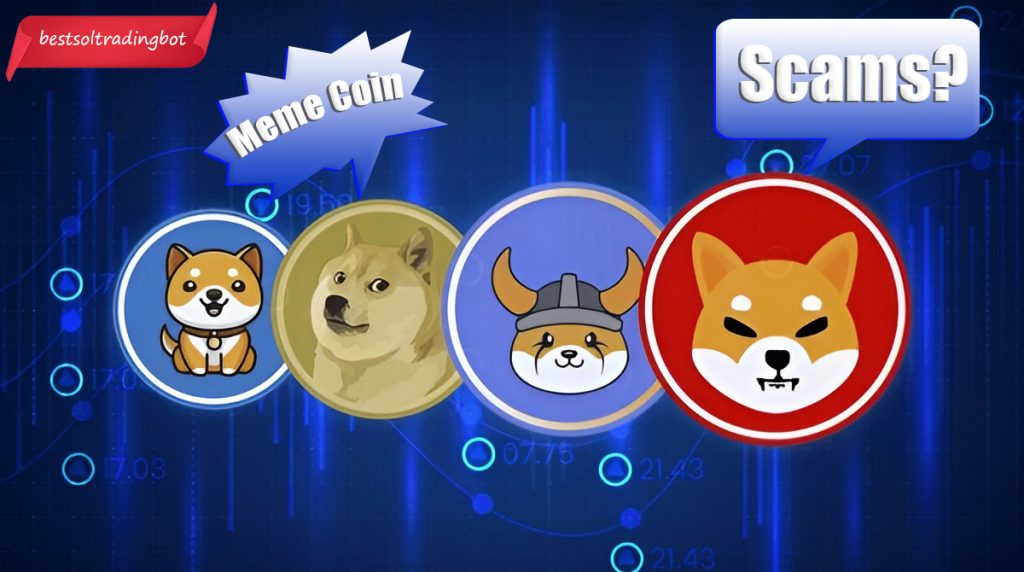Meme coins have taken the cryptocurrency world by storm, captivating investors with their viral appeal and the promise of quick riches. From Dogecoin to Shiba Inu, these tokens often start as jokes but quickly gain traction, attracting thousands of investors. However, alongside legitimate projects, the popularity of meme coins has also given rise to countless scams, targeting unsuspecting individuals.
This article explores common meme coin scams, how to identify them, and actionable tips for safe investing. Whether you’re a seasoned crypto enthusiast or a newcomer, staying informed is crucial to protecting your investments.
Contents
Understanding Meme Coin Scams
Common Types of Scams
Pump-and-Dump Schemes
- Fraudsters artificially inflate a coin’s price through coordinated hype. Once prices peak, they sell their holdings, causing the value to plummet.
- Example: In 2021, several new meme coins experienced rapid price surges, only to crash within days.
Rug Pulls
- Developers abandon a project after collecting significant funds, leaving investors with worthless tokens.
- Example: The Squid Game token soared before its developers vanished, taking millions with them.
Phishing Attacks
- Scammers impersonate legitimate projects to steal personal data or funds through fake websites and social media profiles.
Case Studies
SafeMoon Incident
- Early investors faced significant losses due to allegations of insider trading and unfulfilled promises.
Red Flags to Identify Meme Coin Scams
Lack of Transparency
- Anonymous Teams: Developers without verifiable identities are a major warning sign.
- No Whitepaper: Legitimate projects usually have a clear and detailed whitepaper.
Unrealistic Promises
- Guaranteed Returns: Claims of “100x gains” with little to no risk are often fraudulent.
- Aggressive Marketing: Heavy reliance on influencers and flashy campaigns.
Poor Community Engagement
- Inactive Channels: A genuine project has an active and engaged community.
- Limited Feedback: Developers unwilling to answer questions or address concerns.
Technical Red Flags
- No Audits: Projects without independent smart contract audits are risky.
- Copycat Code: Some scams clone existing projects to appear legitimate.
Conducting Due Diligence Before Investing
Researching the Development Team
- Verify identities and check their professional backgrounds.
- Use platforms like LinkedIn to assess credibility.
Analyzing Project Fundamentals
- Look for clear use cases and a realistic roadmap.
- Review the whitepaper for transparency and viability.
Community and Social Media Presence
- Check forums like Reddit or Discord for organic discussions.
- Avoid projects with suspiciously high follower counts but low engagement.
Technical Evaluation
- Look for projects with open-source code.
- Ensure third-party security audits have been conducted.
Safe Investment Practices

Diversification
- Spread investments across different coins and asset classes to reduce risk.
Setting Investment Limits
- Only invest what you can afford to lose.
- Avoid making decisions based on FOMO (Fear of Missing Out).
Secure Storage Solutions
- Use hardware wallets for significant holdings.
- Enable two-factor authentication and avoid storing private keys online.
Regular Monitoring
- Stay updated with market trends and project developments.
- Be prepared to exit if warning signs emerge.
Utilizing Tools and Resources
Scam Detection Platforms
- Websites like CoinMarketCap track new and suspicious tokens.
Educational Resources
- Use platforms offering courses on cryptocurrency basics and scam prevention.
Regulatory Bodies
- Check statements and warnings from entities like the SEC or local authorities.
Legal Recourse and Reporting
Reporting Scams
- Contact local law enforcement or financial regulatory bodies.
- Report incidents on online platforms like CryptoScamDB.
Legal Actions
- Explore the possibility of recovering funds through legal channels.
- Join class-action lawsuits when applicable.
Frequently Asked Questions (FAQs)
1. What are meme coin scams?
Meme coin scams involve fraudulent practices where scammers exploit the hype around meme coins to steal funds or mislead investors.
2. How can I identify a meme coin scam?
Watch for red flags like anonymous teams, unrealistic promises, lack of audits, and inactive community channels.
3. Are all meme coins scams?
No, while some meme coins are legitimate, investors should thoroughly research each project to ensure its authenticity.
4. What should I do if I fall victim to a meme coin fraud?
Report the scam to local authorities, regulatory bodies, and online platforms dedicated to tracking cryptocurrency fraud.
5. How can I safely invest in meme coins?
Diversify your investments, conduct thorough due diligence, and store your assets securely.
References
Disclaimer
This article is for informational purposes only and does not constitute financial or investment advice. Cryptocurrency investments are inherently risky, and readers should consult a financial advisor or conduct their own research before making any decisions.

